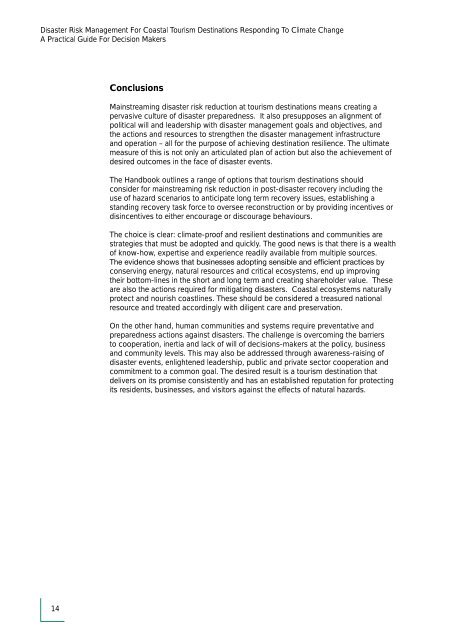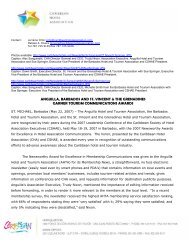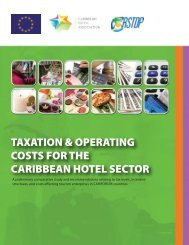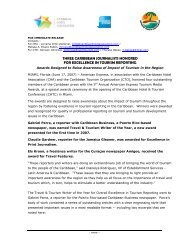Disaster Risk Management for Coastal Tourism - Caribbean Hotel ...
Disaster Risk Management for Coastal Tourism - Caribbean Hotel ...
Disaster Risk Management for Coastal Tourism - Caribbean Hotel ...
Create successful ePaper yourself
Turn your PDF publications into a flip-book with our unique Google optimized e-Paper software.
<strong>Disaster</strong> <strong>Risk</strong> <strong>Management</strong> For <strong>Coastal</strong> <strong>Tourism</strong> Destinations Responding To Climate Change<br />
A Practical Guide For Decision Makers<br />
Conclusions<br />
Mainstreaming disaster risk reduction at tourism destinations means creating a<br />
pervasive culture of disaster preparedness. It also presupposes an alignment of<br />
political will and leadership with disaster management goals and objectives, and<br />
the actions and resources to strengthen the disaster management infrastructure<br />
and operation – all <strong>for</strong> the purpose of achieving destination resilience. The ultimate<br />
measure of this is not only an articulated plan of action but also the achievement of<br />
desired outcomes in the face of disaster events.<br />
The Handbook outlines a range of options that tourism destinations should<br />
consider <strong>for</strong> mainstreaming risk reduction in post-disaster recovery including the<br />
use of hazard scenarios to anticipate long term recovery issues, establishing a<br />
standing recovery task <strong>for</strong>ce to oversee reconstruction or by providing incentives or<br />
disincentives to either encourage or discourage behaviours.<br />
The choice is clear: climate-proof and resilient destinations and communities are<br />
strategies that must be adopted and quickly. The good news is that there is a wealth<br />
of know-how, expertise and experience readily available from multiple sources.<br />
<br />
conserving energy, natural resources and critical ecosystems, end up improving<br />
their bottom-lines in the short and long term and creating shareholder value. These<br />
are also the actions required <strong>for</strong> mitigating disasters. <strong>Coastal</strong> ecosystems naturally<br />
protect and nourish coastlines. These should be considered a treasured national<br />
resource and treated accordingly with diligent care and preservation.<br />
On the other hand, human communities and systems require preventative and<br />
preparedness actions against disasters. The challenge is overcoming the barriers<br />
to cooperation, inertia and lack of will of decisions-makers at the policy, business<br />
and community levels. This may also be addressed through awareness-raising of<br />
disaster events, enlightened leadership, public and private sector cooperation and<br />
commitment to a common goal. The desired result is a tourism destination that<br />
delivers on its promise consistently and has an established reputation <strong>for</strong> protecting<br />
its residents, businesses, and visitors against the effects of natural hazards.<br />
14








